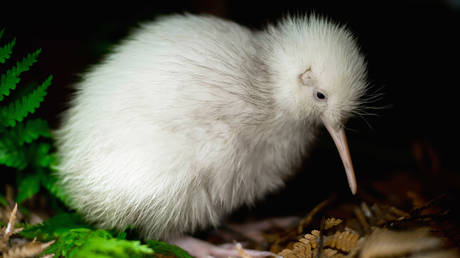
Manukura, the first-ever white kiwi to hatch in captivity, was a wildlife ambassador in New Zealand, and her untimely death is described as “one of the saddest days” by the wildlife center where she lived.
The kiwi, the national bird of New Zealand, are usually brown, but Manukura was born with white plumage thanks to an extremely rare genetic trait carried by both her parents. She was the first of three white kiwis to hatch at Pūkaha National Wildlife Centre in New Zealand during the 2011-2012 breeding seasons. Her younger brother, Mapuna, who is also white, is part of Pūkaha’s captive breeding programme.
During the first year of her life she was thought to be a male, but DNA tests showed that she was in fact female, with the discovery being described as “yet another surprise from this extraordinary bird”.
Manukura was named by a local Maori tribe, who saw her as a sign of new beginnings, with her name meaning ‘of chiefly status.’ White kiwis can exist in the wild but are considered so rare that seeing one in its natural habitat is highly unlikely.
Manukura, who was nine years old, died following an operation to remove an unfertilized egg that she was unable to lay. Her death was announced on Monday on Pūkaha’s Instagram page, with staff saying that she would be sorely missed.
Emily Court, the general manager at Pūkaha, said it was “one of the saddest days the wildlife center had experienced.”
Manukura had become an ambassador for both the Pūkaha National Wildlife Centre where she lived and for the plight of her endangered species.
She had her own Facebook page and also inspired stuffed toys, memorabilia and a picture book by renowned New Zealand author Joy Cowley, who drew a connection between the uniqueness of the white kiwi and that of every child.
The regional Department of Conservation said that “Over the past 10 years, she delighted multitudes of people and in her own quiet way shone a spotlight on the precarious plight of kiwi in the wild”.
Kiwi chicks have a very high mortality rate and often don’t make it to adulthood. Those who do have very long lives, with a typical life span being between 25 and 50 years.
The Kiwi is a significant national icon, equally cherished by all cultures in New Zealand, a symbol for the uniqueness of New Zealand’s wildlife and the value of the country’s natural heritage.
Think your friends would be interested? Share this story!




